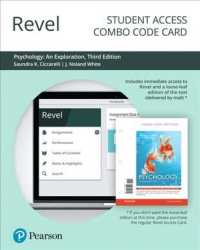Full Description
This book focuses on approaches to teaching and learning that integrate emerging technologies to enhance the quality of education. It brings together conceptual and empirical insights to elaborate on the design of effective programs, educational policies and educational administration requirements. The chapters cover topics such as social media's use in learning, virtual learning, innovative pedagogy, data mining, massive open online courses (MOOCs) and sustainable education. Special emphasis is placed on virtual and augmented reality (VR/AR), and the use of electronic devices such as tablets and smartphones in the classroom.
The authors explore how advances in information and communication technology (ICT) can improve opportunities through education for all. It presents an international perspective, with authors from Europe, Asia, the Middle East, and North and South America.
Contents
Introduction. The Future of Innovation and Technology in Education: A Case
for Restoring the Role of the Teacher as a Mentor; Anna Visvizi, Miltiadis D.
Lytras and Linda DanielaPart I. Learning
Innovation for Digital Economy and Sustainable Development
Chapter 1. How to Predict the Unpredictable:
Technology-Enhanced Learning and Learning Innovations in Higher Education;
Linda Daniela, Anna Visvizi and Miltiadis D. Lytras
Chapter 2. Focus on the Agency of Learners to Innovate in
Pedagogy; Marc Nagels, Marie-Hélène Abel and Fatiha Tali
Chapter 3. A Review of Educational Innovation from Knowledge
Building Pedagogy Perspective; Calixto Gutiérrez-Braojos, , Jesús
Montejo-Gámez, Ana Marín-Jiménez and Fátima Poza-Vilches
Chapter 4. Agile Digital Skills Examination for the Digital
Economy: Knowledge and Social Capital Management Frameworks through Social Networking; Fragkiskos Filippaios and Vladlena Benson
Chapter 5. Innovation in Higher Education: Toward Enhancing
Sustainable Development; Saad Haj Bakry
Part II. The Use of
ICT for Teaching, Learning and Assessment
Chapter 6. Collaborative Writing and Knowledge Creation in a Social Media Online Community; Anu Suominen and Jari Jussila
Chapter 7. How to Use ICT in a Classroom Effectively? The
Technological Blend; Theoni Tsinonis
Chapter 8. The Use of Tablets in Secondary Education: Students' Perspectives and Experiences; Margarida Lucas
Chapter 9. School Website as a Media: Practice and Potential
of the School Website Content; Baiba Arina
Chapter 10. Using Facebook as a Massive Open Online Course
Environment: Supported Functionalities and Challenges; Dries Van De Weghe and
Yves Wautelet
Chapter 11. Assessing the Impact of Virtual Reality on Engineering Students' Spatial Ability; Rafael Molina-Carmona, María Luisa
Pertegal-Felices, Antonio Jimeno-Morenilla and Higinio Mora-Mora
Chapter 12. Immersive Experiences in Online Higher Education: Virtual Presence and Flow; Inma Rodríguez-Arduraa and Antoni
Meseguer-Artola
Chapter 13. Educational Data Mining for Peer Assessment in
Communities of Learners; Maria De Marsico, Filippo Sciarrone, Andrea Sterbini
and Marco Temperini
Part III. Case Studies
Chapter 14. Student-teachers' Ability to Implement
Competency Approach: The Case of the University of Latvia; Linda Daniela,
Raimonds Strods, Zanda Rubene and Sandra Kalniņa
Chapter 15. O2O Teaching Reform in China: Outcomes-based
Education (OBE); Muqiang Zheng, Chien-Chi Chu, Yenchun Jim Wu
Chapter 16. A Prescriptive Instructional Systems Design
model: A Rasch-model Case for Saudi Arabia; Allaa Barefah, Elspeth McKay and
Sulaiman Alqahtani
Chapter 17. Do We All Speak the Same Language in Europe? Finding Out by Playing; Evi Hatziandreou, Anthi Soulitsioti and Yannis
Mastrogeorgiou
Chapter 18. Innovation in Dean's Office: The Case of Polish
HEIs; Katarzyna Górak-Sosnowska
Conclusion. Chapter 19. Education, Innovation and the Prospect of Sustainable Growth and Development; Anna Visvizi, Miltiadis D. Lytras and Linda
Daniela







